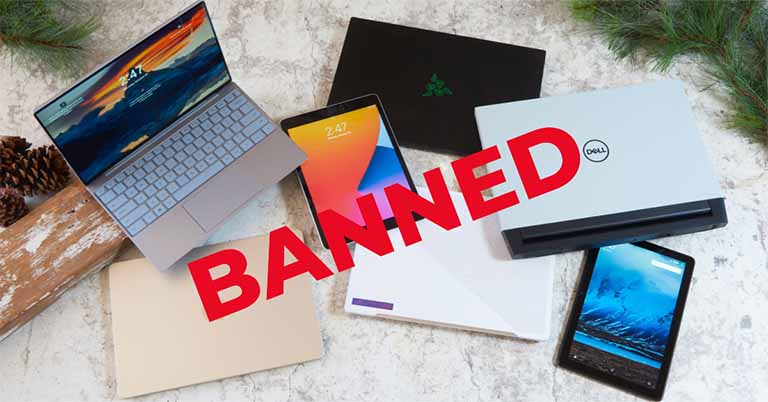
India recently placed a ban on the import of laptops, tablets, all-in-one personal computers, and ultra-small form factor computers falling under HSN code 8741. Although not official, it is speculated that the Indian government made this move to strengthen domestic manufacturing. The Directorate General of Foreign Trade (DGFT) and the Ministry of Commerce and Industry made this decision. It will impact the tech industry and consumers related.
Key Changes and Implications
Computing machines under HSN 8741 will now require a special import license. This restriction is an effort to place delays in the import of such products to motivate manufacturing inside the country.
The restriction doesn’t apply under the baggage rule. That is, if consumers buy these devices from online shops for personal use, they don’t need a special permit but still have to pay taxes. Moreover, import license exceptions grant approval for particular purposes like conducting research, development, testing, benchmarking, evaluation, repair, and re-export.
However, the implementation of these import restrictions is postponed until October 31, 2023. This adjustment allows manufacturers and importers more time to adapt to the new regulations.
What is the import restriction for?
The laptop import ban in India align with the government’s broader agenda to promote domestic manufacturing. This decision is similar to what was done before with color TVs. Back then, encouraging local TV-making worked well, so they’re trying it again with these devices.
The import restrictions are likely to pave the way for local electronics manufacturers to flourish. Even though a few parts could still be brought in from outside, local businesses might find it simpler to get special licenses that let them bring in those parts. This shift could provide a competitive advantage to Indian electronics companies and manufacturers.
Short-Term Challenges for PC OEMs
However, PC original equipment manufacturers (OEMs) might encounter challenges in the immediate future. According to data from the International Data Corporation (IDC), India’s traditional PC market saw a decline of 30.1 percent year over year in the first quarter of 2023. This restriction on imports may result in short-term supply disruptions. It will particularly affect brands that are heavily reliant on imports like Acer, Samsung, Panasonic, Apple, Lenovo, and HP.
- You may also read:
- This QR terminal lets you hear exactly how much you got paid
- India Bans 59 Chinese Apps: Everything You Need To Know
- Top 5 YouTube to MP3 converters for Mac that you should know
Conclusion
In the long term, this policy shift could lead to increased local production of laptops, tablets, and personal computers, reducing India’s reliance on imported devices. The government’s strategy underscores its commitment to fostering a self-reliant and robust electronics industry, aligning with the larger vision of the “Make In India” campaign.
As the tech industry navigates these changes, consumers can expect to witness the evolution of the market and the emergence of new opportunities for local manufacturers.
- Meanwhile, check out our review of the OnePlus Nord 3.







![Best Gaming Laptops in Nepal Under Rs. 250,000 (रु 2.5 Lakhs) [2025] Best Gaming Laptops Under 2.5 lakhs in Nepal [Feb 2025 Update]](https://cdn.gadgetbytenepal.com/wp-content/uploads/2025/02/Best-Gaming-Laptops-Under-2.5-lakhs-in-Nepal-Feb-2025-Update.jpg)
![Best Gaming Laptops in Nepal Under Rs. 120,000 (रु 1.2 Lakhs) [2025] Best Budget Gaming Laptops Under Rs 120000 in Nepal 2025 Update](https://cdn.gadgetbytenepal.com/wp-content/uploads/2025/05/Best-Budget-Gaming-Laptops-Under-Rs-120000-in-Nepal-2024-Update.jpg)
![Best Laptops Under Rs. 80,000 in Nepal [2025] Best Laptops Under 80,000 in Nepal March 2025 Update](https://cdn.gadgetbytenepal.com/wp-content/uploads/2025/03/Best-Laptops-Under-80000-in-Nepal-March-2025-Update.jpg)
![Best Gaming Laptops in Nepal Under Rs. 200,000 (रु 2 Lakhs) [2025] Best gaming lapotp under 2 lakhs Nepal Feb 2025](https://cdn.gadgetbytenepal.com/wp-content/uploads/2025/01/Best-Gaming-Laptops-Under-2-Lakh-Nepal-Feb-2025-Update.jpg)

![Best Mobile Phones Under Rs. 15,000 in Nepal [Updated 2025] Best Phones Under 15000 in Nepal 2024 Budget Smartphones Cheap Affordable](https://cdn.gadgetbytenepal.com/wp-content/uploads/2024/03/Best-Phones-Under-15000-in-Nepal-2024.jpg)
![Best Mobile Phones Under Rs. 20,000 in Nepal [Updated] Best Mobile Phones Under NPR 20000 in Nepal 2023 Updated Samsung Xiaomi Redmi POCO Realme Narzo Benco](https://cdn.gadgetbytenepal.com/wp-content/uploads/2024/01/Best-Phones-Under-20000-in-Nepal-2024.jpg)
![Best Mobile Phones Under Rs. 30,000 in Nepal [Updated 2025] Best Phones Under 30000 in Nepal](https://cdn.gadgetbytenepal.com/wp-content/uploads/2025/01/Best-Phones-Under-30000-in-Nepal.jpg)
![Best Mobile Phones Under Rs. 40,000 in Nepal [Updated 2025] Best Phones Under 40000 in Nepal 2024 Smartphones Mobile Midrange](https://cdn.gadgetbytenepal.com/wp-content/uploads/2024/02/Best-Phones-Under-40000-in-Nepal-2024.jpg)
![Best Mobile Phones Under Rs. 50,000 in Nepal [Updated 2025] Best Phones Under 50000 in Nepal](https://cdn.gadgetbytenepal.com/wp-content/uploads/2025/01/Best-Phones-Under-50000-in-Nepal.jpg)
![Best Flagship Smartphones To Buy In Nepal [Updated] Best flagship phone 2025](https://cdn.gadgetbytenepal.com/wp-content/uploads/2024/07/Best-Flagship-Phones-who-is-it-ft-1.jpg)